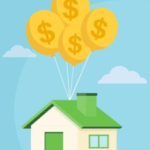The Importance of Setting the Right Asking Price When Selling Your Home

When preparing to sell your home, one of the most critical decisions you’ll face is setting the right asking price. While some sellers may think they can start high and lower the price later, this strategy often does more harm than good. Pricing your home correctly from the start is essential to avoid long market stays, missed opportunities, and a loss of negotiating power.
In this post, we’ll look at why setting the right asking price is so important, the factors influencing it, the common pricing mistakes sellers make, and how a real estate agent can guide you to a successful sale.
Why Pricing Your Home Correctly Matters
Setting the right price is the difference between a quick sale and a prolonged listing. Overpricing your home can cause it to remain unsold for too long, which can raise red flags for potential buyers. According to recent studies, 75% of sellers list their homes at a price higher than what the market will bear, which leads to extended selling periods and reduced buyer interest.
On the other hand, pricing too low may result in an influx of lowball offers or questions about the property’s condition. While the idea of a bidding war from a low starting price might sound appealing, it’s often a risky strategy. Underpricing could leave you with less than you should have received for your property.
It’s crucial to rely on current market data to price your home competitively from the beginning. This way, you can attract serious buyers and avoid unnecessary delays.
Key Factors Affecting the Right Asking Price
To determine the right asking price for your home, consider these three important factors:
1. Market Conditions
Real estate markets fluctuate based on the economy, local supply and demand, and buyer behavior. In a seller’s market, where demand exceeds supply, homes often sell faster and at higher prices. Conversely, in a buyer’s market, where there’s more competition among sellers, you may need to be more strategic with your pricing to stand out.
Other market factors include:
- Location: Homes in desirable areas, such as those with good schools or easy access to amenities, tend to be priced higher.
- Seasonal Trends: Spring and summer tend to be busier times for home sales, while demand might slow in fall and winter, which could require more competitive pricing.
2. Buyer’s Purchasing Power
Mortgage rates heavily influence a buyer’s ability to afford a home. When rates are low, buyers can afford more expensive properties. When rates rise, buying power decreases, which may limit what they’re willing to pay.
For sellers, this means pricing your home in a way that reflects what buyers can afford—not just what your home is worth on paper. Overpricing during a time of high rates could cause your home to sit unsold for longer periods.
3. The Home Itself: Condition and Features
The condition and features of your home are direct influencers of its value. Newly renovated homes with modern upgrades and energy-efficient systems can command higher prices, while homes requiring repairs or outdated features might need to be priced more competitively.
Not all upgrades will increase your home’s value, though. Overly personalized renovations or high-end features that don’t match buyer demand might not justify a higher price.
Common Pricing Mistakes Sellers Make
Pricing mistakes can cost you time and money. Here are the three most common mistakes sellers make and how to avoid them:
1. Overpricing Your Home
Many sellers think starting with a high asking price gives them room to lower it later. This can backfire.
Why it’s a problem:
- Low interest and fewer showings.
- Homes that linger on the market raise suspicion among buyers.
- Multiple price reductions can make the home appear undesirable.
How to avoid it:
Set a price based on solid data, not emotions. Work with a real estate agent to develop a pricing strategy from the start.
2. Ignoring Market Comparisons
Some sellers price their homes based on personal expectations instead of market realities.
Why it’s a problem:
- Buyers and agents assess the price against similar properties in the area.
- A price higher than comparable homes will turn buyers away.
How to avoid it:
Look at recent sales of similar homes in your area and factor in the location, condition, and features to set a competitive price.
3. Refusing to Negotiate
While everyone wants top dollar for their home, being too rigid on price can stop the sale altogether.
Why it’s a problem:
- Buyers expect some room for negotiation.
- Refusing reasonable offers can prolong the sale and lead to missed opportunities.
How to avoid it:
Be open to negotiating price, terms, and closing costs. Trust your agent to guide you on when to accept, counter, or hold firm.
How a Real Estate Agent Can Help You Price Your Home
An experienced real estate agent is invaluable when setting your asking price. Here’s how they can help:
1. Conducting a Comparative Market Analysis (CMA)
A CMA evaluates recent sales of similar properties in your area to determine a fair market value. The agent will look at:
- Homes that have recently sold (comparable size, location, condition).
- Active listings and the competition.
- Seasonal and market trends that could affect buyer demand.
2. Using Proven Pricing Strategies
Beyond setting an initial price, your agent will help strategize ways to generate interest and multiple offers. They may:
- Recommend a price that attracts a wide range of buyers.
- Adjust the price if market conditions shift.
- Suggest pricing just below market value to spark interest.
3. Avoiding Pricing Pitfalls
Your agent will help you avoid common pricing errors such as overpricing, underpricing, or pricing based on emotional attachment. Their expertise ensures your home is priced competitively while maximizing your return.
Conclusion
Setting the right asking price is one of the most crucial steps in selling your home. Overpricing or underpricing can lead to missed opportunities, while pricing it correctly can lead to a quicker, more profitable sale. Working with an experienced real estate agent ensures you have access to market data and expert advice to make informed decisions. By pricing your home correctly from the start, you position yourself for a successful sale in today’s competitive market.


 English
English 












































































































































































































































































































































































